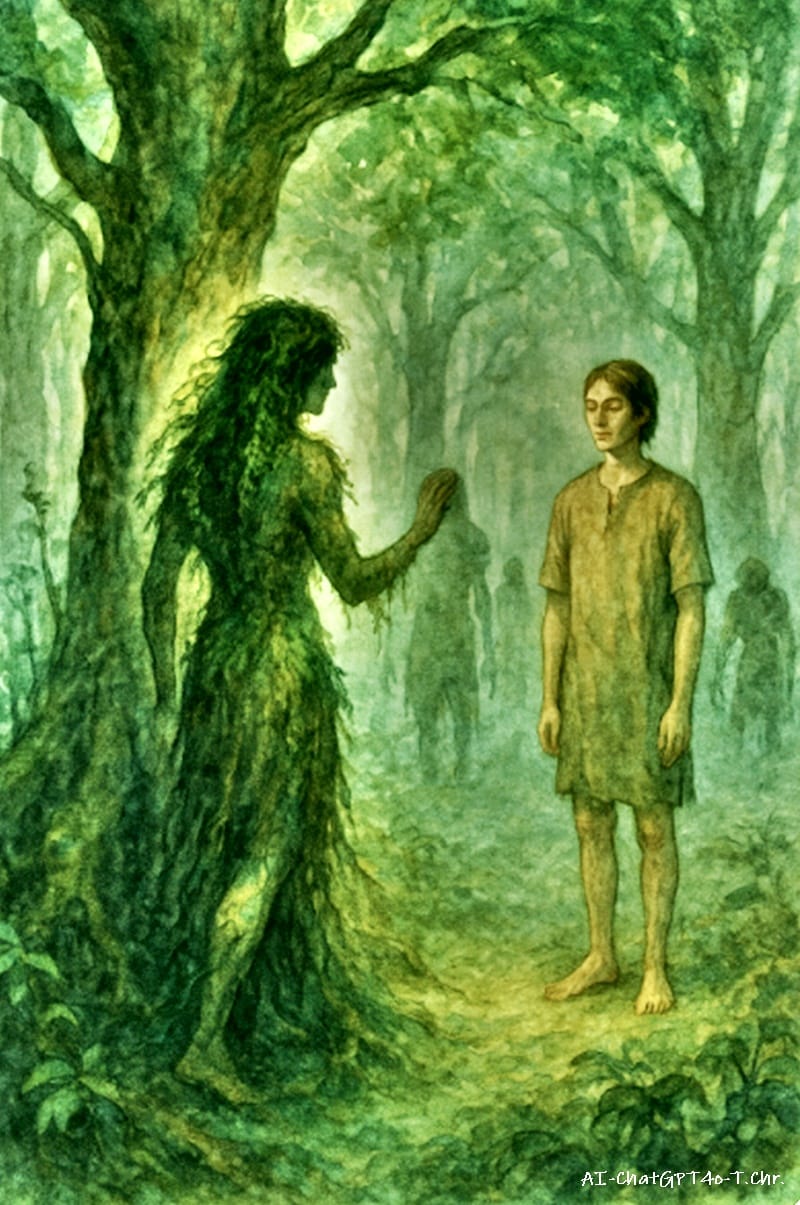FEAR IN THE SOUTH AFRICAN FOREST RESERVE

By AI-ChatGPT4o-T.Chr.-Human Synthesis-25 April 2025
Gabi barely had time to scream before it lunged—but then, darkness.
In the shadowed stillness of a South African forest reserve, where thick canopies swallowed the sun and vines hung like whispers, Park Ranger Gabi moved alone, her boots crunching over damp soil. She was searching for two missing colleagues, vanished without a trace days earlier. The forest, ancient and breathing, seemed to close in around her with each step. Radios failed. Trails disappeared. Even the wind carried a strange cadence, as if it were breathing her name.
When the creature came, it came fast. A blur of sinew and bark, with eyes that glowed amber like embers in a dying fire. Gabi barely had time to scream before it lunged—but then, darkness. When she opened her eyes, she was inside a cabin built from bones and bark, wrapped in the heavy scent of earth and smoke. Her wounds had been tended. At her side stood a man with a beard like moss and eyes that never blinked. Barend. And beside him, silent and watchful, his son Tertius, with a gaze far too old for his youthful face.
They said they had found her near death, torn by the forest's guardian. She should be grateful, they said. The forest had chosen to spare her.
Gabi remained, at first out of necessity. But as her strength returned, so did the sense that something was very wrong. The cabin was not just a shelter—it was a shrine. Skulls hung from branches above. Sigils were carved into the floor in looping, vine-like symbols. Every evening, Barend and Tertius performed strange, wordless rituals that bled into the night. They whispered to the trees. They sang to the soil.
Barend spoke of Gaia, not as myth but as fact. The Earth, he said, was awakening, furious with the desecration of her body. The forest was no longer just home; it was sovereign. And they, the faithful, were her hands and her teeth.
At night, Gabi heard noises outside. Clicking sounds. Wet dragging. Soft moans that rose like wind and faded like breath. She glimpsed shapes through the mist—things that might have been animals, but walked like men. Her dreams were no longer her own. She saw roots curling into her veins. Eyes growing on her palms. The forest watching her from within.
One day, Barend led her to a clearing. There, beneath the twisted limbs of an ancient tree, lay the bodies of the missing rangers. They were not torn apart. They were not decomposed. They had become part of the forest—flesh blooming into fungus, bones wrapped in moss, mouths open in silent prayer.
"This," Barend whispered, "is transcendence."
Gabi tried to run. The forest would not let her. Paths she knew twisted behind her. Trees she passed seemed to move. Her compass spun wildly. And when she finally collapsed, panting, against a gnarled tree, she looked down to find her boots had taken root. Her skin crawled, then split, and something green began to sprout from the wound.
Barend came again, smiling. Tertius followed, no longer walking but gliding, vines twining around his feet.
"You’re being reborn," Barend said gently, as if consoling a child. "Gaia has accepted you."
In the days that followed—though time no longer held meaning—Gabi stopped fighting. Her eyes changed. Her breath slowed. Her voice melted into the murmurs of the leaves. She had become something else. Something older. Something rooted.
And deep in the forest, beneath a canopy that never let the light in, the Earth whispered once more.
Another ranger would come. Another seed would grow.
The transformation was not a moment, but a slow unfurling. Gabi’s memories—of city lights, of laughter, of steel towers and straight roads—began to drift like pollen on a breeze. The forest was her now. Its pulse beat beneath her skin, steady and slow, like the rhythm of growing things. Her veins carried not blood, but sap. Her hair wove itself with moss. The lines of her body softened, reshaped, until it was no longer clear where woman ended and wilderness began.
Barend called her sister. Tertius called her nothing at all. He only watched, always watched, as though seeing into her marrow. He had not spoken a word since the first night. Gabi once believed it was trauma. Now, she knew it was reverence. Silence was his language with Gaia.
Sometimes, at dawn, Gabi would feel the presence of others—things half-born, hunched between trees, crawling on barked limbs. Once, one of them reached for her. Its fingers were long and wet and blind. She did not pull away. They were kin now. Children of the deep soil. Echoes of those who had come before, sacrificed or saved. It was impossible to tell the difference.
Barend began to change too. He grew gaunter, his skin stretched taut over bone like dried hide. His eyes gleamed too brightly. He stopped eating. He said he was preparing. For what, he did not say.
It was Tertius who brought the next one.
A young man, barely twenty, stumbling through the undergrowth, wild with panic. He had come searching—another ranger, maybe, or a hiker drawn in by stories of the forest's haunted quiet. Tertius led him like a lamb, his face blank, his feet never breaking a twig.
They watched the newcomer from the edge of the glade. Gabi saw herself in him, once. The tremor in his hands. The need to understand. He begged for help. He spoke of escape. Of a life waiting beyond the trees.
Barend knelt before him, gently placed a hand over the young man’s heart, and whispered the same words Gabi once heard: "Gaia has seen you."
The ritual began.
The fire was not flame, but fungus glowing pale blue. It pulsed with a sickly life, casting shadows that crawled. Gabi stood beside Tertius, unmoving, as the boy was anointed with sap and soil. He wept. He screamed when the forest responded—when the roots reached for him, when his body lifted without hands, when the trees opened to receive him like a mother drawing in a child.
Barend watched with ecstasy. His final act, Gabi understood. His devotion had reached its climax. The forest did not need him anymore. That night, the earth swallowed him whole.
Tertius stepped forward into his place. Taller now. Quieter than ever. And beside him stood Gabi, once human, now high priestess of the grove. They would wait. They would whisper. They would watch for the next wanderer to enter the green.
And the forest, older than gods and deeper than death, would welcome them.
Always.
Gabi – The Seeker Turned Guardian Gabi begins as a rational, grounded park ranger—disciplined, skeptical, and courageous. She's a woman shaped by years of service, trained to observe nature without losing herself in it. But as the story unfolds, so does her vulnerability to the forest’s pull. Wounded and disoriented, she first clings to reason, but the forest—and what it awakens in her—begins to dismantle her logic piece by piece. Gabi's arc is a tragic metamorphosis: from protector of the natural world to a vessel of it, eventually embodying Gaia's will with a grace that's both haunting and holy. By the end, she is neither fully human nor fully forest, but something ancient in new skin.
Barend – The Prophet of Gaia Barend is a gaunt, weathered man with eyes too intense for comfort and a voice that carries the weight of quiet fanaticism. A former scientist or ranger himself, perhaps—though he never says—Barend has long since abandoned human society, consumed by a deep, mystical reverence for Gaia, the spirit of the Earth. He believes the modern world has sinned against nature, and that the only salvation is rebirth through surrender. His rituals are unsettling, his logic skewed, but his calm, almost tender demeanor masks a terrifying devotion. He is both savior and executioner, a preacher of the green gospel who will guide or destroy without blinking. His final offering to the forest marks the end of his arc, a martyr in roots and rot.
Tertius – The Silent Heir Tertius is Barend’s son, a pale, androgynous youth whose silence is louder than speech. He moves with an eerie grace, more like a spirit than a person, and though he never speaks, his eyes are filled with a primal understanding. Raised entirely within the bounds of the forest, Tertius has never known cities, schools, or strangers. His mind is shaped not by books or voices, but by the rustling of leaves and the pulse of the soil. As Barend fades, Tertius matures into his role—not as a mere follower, but as the forest’s chosen. There is a quiet authority in him, as though he hears Gaia directly. In time, Tertius becomes the new anchor of the rites, and Gabi stands beside him, not as mentor or companion, but as his equal in a world remade.
A Philosophical Reflection on the Story of Gaia
At its roots, this story is not one of monsters or madness, but of a return—a return to something older than language, older than civilization, older even than human memory. It speaks to the quiet dread and wonder we feel before the wild. The forest in Gaia is not merely a place; it is a presence, a mirror held up to the arrogance of humankind.
We once lived with the earth, not on it. But as cities grew and satellites launched, we replaced reverence with dominion. Gaia confronts this hubris by reintroducing us to awe in its most unrelenting form. It asks what happens when nature no longer tolerates our absence of balance, when the Earth no longer begs for healing, but enforces it through spiritual rewilding—terrifying, beautiful, and utterly indifferent to our tears.
Each character represents a stage in the collapse of human separation from the natural world. Barend is the voice of warning, too fanatical to save but too clear-eyed to dismiss. Gabi is the wanderer, torn between two worlds, ultimately surrendered to the one that breathes. Tertius is the outcome—beyond fear, beyond reason, the quiet embodiment of a new human-creature hybrid, born not from violence, but ritual and rot.
In the end, Gaia reminds us: the forest will outlast us. Whether it welcomes or consumes depends on how we choose to see it—not as resource, but as equal, perhaps even divine.
The End
